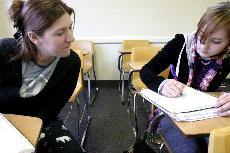Just when students think the semester is over, finals week is there to greet them in the end.
Most students spend quality time with their finals week, from studying in the library until closing, to pulling all-nighters with a semester-long research paper. But for some students, finals week wants too much of a commitment and can tend to get clingy, especially when all students are looking forward to is a winter break.
For those who can’t give finals week a fighting chance, cheating can sometimes become a too easy and too convenient option.
Marcia Petty, vice president for student affairs, has not dealt with any academic dishonesty this semester, and most students are familiar with the prenuptial agreement on their syllabus, specifically stating their professor’s stance on academic dishonesty. Despite these standards, cheating on Loyola’s campus does not go unnoticed.
Students like English literature junior Becky Schattman are all too familiar with cheating on college campuses.
“I have had lots of classes where the professor just walks out and everyone takes out their notebooks,” she said. “Sometimes they get busted, but you get what you deserve.”
According to Petty, situations like these would fall under the section titled “Conduct Unbecoming of a Loyola Student” in Loyola’s student handbook. When it comes to handling these issues, the students are in the hands of the associate dean of the respective college, said John Cornwell, assistant provost.
Angie Brocato Hoffer, assistant dean of the College of Social Sciences, follows the protocol according to the 2006-2007 Undergraduate Bulletin, specifically under the Integrity of Scholarship and Grades section.
The latest results from the Center for Academic Integrity, a national organization that identifies and promotes academic integrity among students, faculty and administrators, indicate that cheating among students starts relatively early and continues to grow, reaching a point where it the students deem it acceptable.
The Center also found that 70 percent of students admit to some form of cheating, with 40 percent using the Internet for what is called “cut and paste” plagiarism.
“Students have a sense that the Internet is a shared resource, where putting your name on something makes it yours,” said music performance professor Alice Clark.
Is academic infidelity the compromise for academic integrity? According to Clark, the “times are changing.”
“The reasons we have rules in place for things like these is a fairness issue,” she said. “Most students have a sense a responsibility when it comes to getting their work done. If they have an excuse, I usually receive frantic calls and e-mails about transportation or computer problems.”
EXCUSES ABOUND
Students’ excuses used to get out of exams may have worked in the past, but most Loyola professors have heard nearly every excuse in the book.
English professor Christopher Chambers recalls one colleague who wrote a letter of condolence to a student’s family whenever he dropped the “my grandma died” excuse before a test.
“Most of the time I’ll give them the benefit of the doubt,” Chambers said concerning a students’ excuse. “I assume that if a student is really interested when they come into my class, why would they need to cheat?”
“I have known a guy who once asked a girl with mononucleosis to spit in his drinks,” said marketing junior Marissa Vento. “He wanted a doctor’s note so he could stay in bed and get out of his exam.”
“I think in high school, it may have been the cool, easy thing to do,” Vento said. “But now it’s not just about the grade.”
Alex Woodward can be reached at [email protected].







